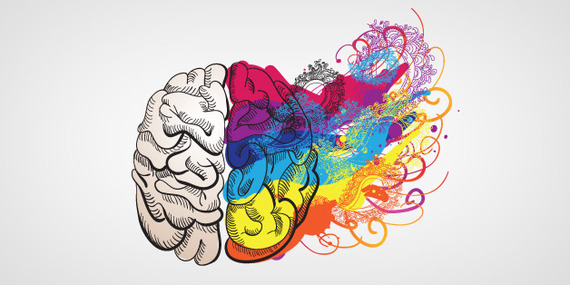Image: venimo via Adobe Stock
The role of the brain
Usually my clients come to me because they're tired of the effort it takes to keep dieting -- they're fed up with losing weight only to regain it -- (often regaining to an even higher weight) over and over again. They cannot understand why they don't seem able to lose the weight and then maintain it. What they don't often realize at first, is that dieting can actually cause the problem in the first place, and that the regain is because of the act of dieting itself.
When I learned this, it was a major turning point in my life. I had metaphorically beaten myself black and blue with dieting and over-exercising, but mostly with self-recrimination for repeatedly failing to stay thin! I had delved into my past, looking for the cause of my eating behaviors -- questioned my childhood, the things I'd witnessed growing up, the small jibes I'd received along the way... nothing ever stood out as the cause. I'd come to believe that it wasn't one event, but an accumulation of small things, and my interpretation of those things, that were what led to my disordered eating.
What I hadn't factored into the equation was the very act of dieting itself.
In this post, I'll look at just one of the reasons why diets don't work and it's about the role of the brain. This is my layman's understanding of the neuroscience of dieting.
When we diet, we typically restrict food -- either it's food groups or calories and usually both. As well as this, we're usually exercising more than usual.
The reptilian part of the brain (the most primitive part of the brain that evolved first) is responsible for: our involuntary movements; regulation of food and liquid intake, and our survival mechanism.
The reptilian brain is the first part of the brain to perceive and respond to stress -- which makes sense, since it's in charge of survival. It goes into emergency drive when it senses a threat and it takes control. Note I said senses a threat. For the survival mechanism to be triggered, it doesn't have to be real -- the brain can't tell the difference between a real physical threat -- e.g. a lion chasing you or an emotional threat, say the fear of failure, or someone shouting at you. When the reptilian brain is in survival mode, it hijacks the rest of the brain's system. This is why it's very hard to 'think logically' when in these situations. The reptilian brain can't distinguish between emotional and physical pain so it sends out danger signals to other parts of the brain, which means the whole body goes into a state of protective stress.
So what does this mean in relation to dieting?
What happens when we ignore our hunger or restrict calories, is that the brain goes into survival mode -- the danger of FAMINE is detected! I know it seems hard to imagine in our world of plenty, but the reptilian brain hasn't evolved to accept this -- that's the job of the neocortex which has been hijacked.
What happens physiologically, is that the reptilian brain sends a stress signal to the body to slow down its metabolism, as it needs to do more with less, as well as to store fat. This means that the food we do eat isn't burned efficiently. As well as this, if you're exercising more than normal, your body will be under extra stress. Just try to imagine it in palaeolithic terms -- there you are, in your loin cloth -- there's a famine on, and then a lion starts to chase you and you have to physically exert yourself to stay alive. Making sense?
Then, if you've managed to stick to the diet for the period indicated, and lost the weight, aka the 'famine is over', the brain can do nothing else but FEAST!
I remember once I'd been on a very restrictive diet, that was supposed to increase my metabolism, reset my weight set point and balance my hormones -- (my period actually stopped on this diet - great hormonal balancing!). I have such a vivid memory of my eating behavior after this diet. It did seem as though I could do nothing to stop myself from eating huge quantities of high calorie foods. I ate and ate and ate. It took me three months to regain the 17 kgs I'd lost.
It's your brain's very efficient way of ensuring your survival.
Now that I understand the neuroscience behind it, I understand that it was just my reptilian brain's way of ensuring my survival -- as it was protecting me from future famines, and it was right to do so, because my next diet started soon after. For many of us, the famine starts on a Monday.
My next post looks at another aspect of why diets don't work. It's all about disconnection.
